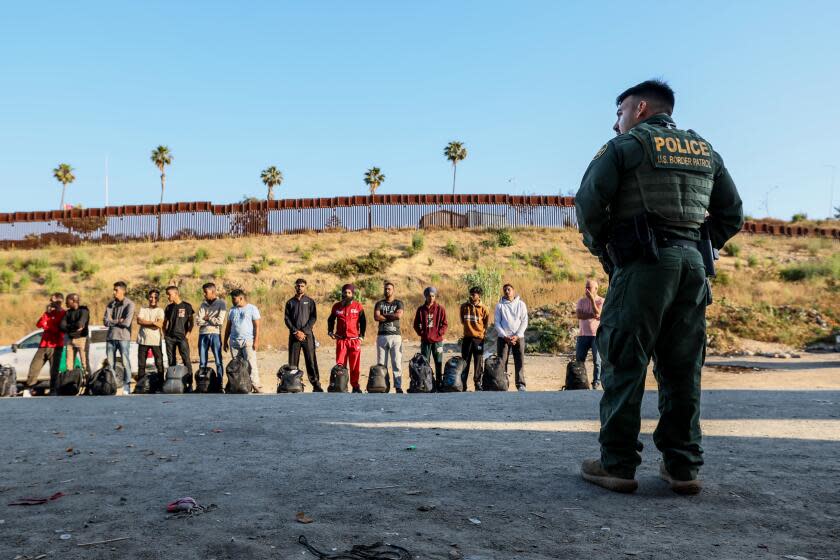Border patrol officers falsely imprisoned 9-year-old U.S. citizen, judge rules

U.S. Customs and Border Patrol must pay a family $1.5 million after officers falsely imprisoned a 9-year-old girl and her teenage brother entering the United States from Mexico to go to school, a federal judge ruled this month.
U.S. District Judge Gonzalo Curiel ruled that the agency falsely imprisoned two United States citizens — Julia, who was then 9, for 34 hours and her brother, Oscar, who was then 14, for roughly 14 hours. Curiel also found that the agency was liable for intentional infliction of emotional distress and negligence in the 2019 incident, which was first reported by the San Diego Union-Tribune.
"The government's conduct in detaining U.S. citizen children at the border for 14 and 34 hours respectively ... exceeded all bounds of that usually tolerated in a civilized community," Curiel wrote in his ruling.
A spokesperson for U.S. Customs and Border Protection said the agency "makes a good-faith effort to resolve all complaints justly and fairly, including complying fully with orders issued by the federal district courts."
"The health and safety of individuals in our custody, our workforce and the communities we serve is paramount," the spokesperson wrote in an email to The Times.
Read more: Border Patrol must care for migrant children who wait in camps for processing, a judge says
Julia and Oscar, who lived in Tijuana with their parents, were attempting to cross the border at the San Ysidro Port of Entry to attend school in the United States on March 18, 2019, according to the family's lawsuit filed in 2022.
The pair had crossed the border many times before, but the situation took an unusual turn when they were stopped after a Border Patrol officer noticed a dot on Julia's passport photo that appeared to be a mole she didn't have in person.
The siblings were taken to a secondary inspection area where a supervisor selected an officer with “a reputation for obtaining confessions” to interview them. The officer allegedly pressured Julia to say she was actually her Mexican cousin, according to court records.
No one else was in the room during the interview, which was a violation of the agency's policy, Curiel noted in his ruling. The government refuted the idea that officers coerced the girl into falsely saying she was her cousin. They maintained in court records that she and Oscar both said, without being prompted, that the girl's name was Melany. This "confession" led the officers to suspect Oscar was trafficking the girl, according to court documents.
Curiel criticized the officers in his ruling for failing to interview family members who could have provided proof of the girl's identity and not reviewing documents that could have quelled their suspicions.
"Common sense and ordinary human experience indicate that it was not reasonable to detain Julia for 34 hours to determine her identity or to detain Oscar for about 14 hours to determine whether he was smuggling or trafficking his sister when multiple means of investigation were available and officers unreasonably failed to pursue them," Curiel wrote.
Read more: Border Patrol reports arrests are down 25% since Biden announced new asylum restrictions
As the children were being held in separate detention cells, their mother, Thelma Medina Navarro, and other family members were trying to find out where they were and provide documentation that would show their identities.
Oscar was released later that night, but Julia remained in custody. Navarro, who was desperate to have her daughter released, went to the television news outlet, Telemundo, and recorded an interview. The next day, the Mexican Consulate sent representatives to interview Julia. They determined her true identity and she was released, according to court records.
The two children remain distressed following the incident. Oscar's grades declined and his parents sought therapy for him. Julia, who was also in therapy following her detention, also suffered insomnia and nightmares that have continued for years, Curiel wrote in his ruling.
Curiel awarded $250,000 to the children's mother, $175,000 to Oscar and $1.1 million to Julia.
The family's attorney, Joseph McMullen, said he appreciated Curiel not only for the verdict, but for allowing "the opportunity to examine at trial, the high-level CBP officials who were complicit in this outrageous conduct."
He said the agency did not take any steps to correct or investigate the behavior that led to the false confessions.
"No employee interviews were conducted. All audio and video evidence was deleted. CBP simply put out a press release blaming the children and swept the rest under the rug," McMullen said. "If CBP will try to hide the truth when U.S. citizen children are treated so outrageously, imagine how often misconduct against undocumented children will go on uncorrected. I find that deeply troubling."
This story originally appeared in Los Angeles Times.


